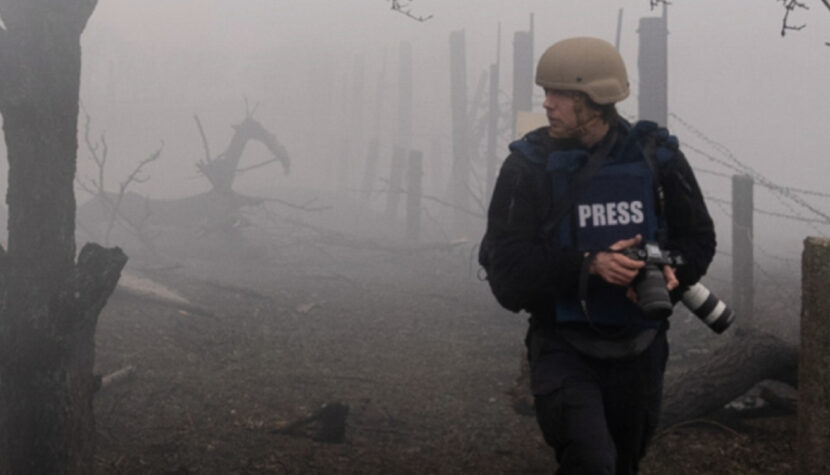20 Days in Mariupol. The First Oscar in Ukraine’s History [REVIEW]

Today it’s hard to believe, but the full-scale invasion of Russia into Ukraine began over two years ago – at the end of February 2022, shortly after the Winter Olympics in Beijing. One of the first major cities to find itself in the path of the Russian march was Mariupol – located on the Sea of Azov, near the border. During the siege, the city was effectively cut off from the rest of Ukraine: extensively bombed, far behind the front line, it could not count on help from the depths of the country. Seeing what was happening, most journalists left Mariupol before the occupier’s troops arrived. Remaining on-site were Mstyslav Chernov, Evgeniy Maloletka, and Vasisilisa Stepanenko, working for the American television station PBS and the Associated Press agency. “20 Days in Mariupol” is a documentary account of the history of the besieged city.
It is a raw report, not devoid of drastic elements. The camera follows soldiers and policemen. It tracks successive human tragedies, ultimately finding a foothold in Mariupol’s largest hospital. It is there that we witness the most shocking events. Ukrainian reporters capture individual stories of suffering from the sea of pain. A boy who first lost his legs, and then his life, because he was playing soccer with his friends during an air raid. A pregnant woman who was in a bombed maternity ward. Shrapnel pierced her stomach, killing her unborn child – soon she bled to death as well. War knows no mercy. Orphaned children and grieving parents flicker across the screen. “I know it’s hard to watch,” says Chernov, the narrator, from off-screen. “But it has to be hard to watch,” he adds after a moment.
One of the most important questions the director poses to himself in the off-narration is, “Should I even be recording all of this?” He quickly answers it, finding a kind of mission in recording the events in Mariupol – his contribution to the immensely significant information war. Every day, along with his closest colleagues, he sneaks into the Russian-controlled area where there is internet access. They are driven by the statements of heroes holding public positions. A policeman makes a statement directly to the camera, pleading for immediate help from the West. A doctor performing resuscitation on a young boy shouts at Chernov, “Show Putin the eyes of this child! Show what these bastards are doing to our civilians!”

However, the mentioned civilians react very differently to Chernov’s camera. There are moments when the director seems to cross an ethical line, unnecessarily dragging traumatized residents of Mariupol into the spotlight. He asks passersby for their names – in response, he is told to back off. Not everyone is willing to stand in front of the camera when their whole world is crumbling. Showing a man who is burying bodies in mass graves, Chernov starts probing, “How do you feel now?” Such a question is like a slap in the face. How can one even respond to something like that? The man doesn’t want to say anything, fearing he will start crying, but the director doesn’t leave him alone. Paradoxically, the biggest weakness of “20 Days in Mariupol” turns out to be an unjustified disbelief in the power of cinematic imagery – an unwarranted fixation on verbal commentary, presumably stemming from the television background of the creators. This applies also to the off-narration: sometimes raw, focused on the “here and now,” and sometimes quasi-poetic, insistently autobiographical.
“20 Days in Mariupol” is already the fourth documentary about Russia’s invasion of Ukraine that I’ve reviewed. Since the war is ongoing, more films are being made. It’s strange somehow to value them, to rank them from best to worst. Each of them shows the tragedy of the Ukrainian people from a different perspective, using different narrative techniques. Wolski and Pawlus (“In Ukraine”) did it in a decidedly more detached way, leaving the story in the “hands” of the landscape fragmented by bombs. Maciej Hamela refreshed the infamous “car interview” convention in “From Where to Where,” approaching his interviewees with the empathy and patience of a seasoned documentarian (the time spent together paid off, built trust between the creator and the characters, and resolved language barriers). The exception is Sean Penn’s “Superpower,” which is not even worth mentioning – despite his noble intentions, the American made a film more about himself than about what’s happening in Ukraine. “20 Days in Mariupol” stands out in this group with its reporter’s determination. No other film from this group is as stark and direct. None of them was also made by native Ukrainians. Most likely, these qualities determined that Chernov’s, Maloletka’s, and Stepanenko’s documentary was honored by the American Academy of Motion Picture Arts and Sciences.

“Film creates memory, and memory creates history,” said Mstyslav Chernov from the stage of the Dolby Theater, receiving the first Oscar in the history of Ukrainian cinematography. His speech, alongside Jonathan Glazer’s, was undoubtedly the strongest accent of this year’s ceremony. It was an appeal for help, disrupting the viewer’s comfort. Chernov also admitted outright: if such an opportunity arose, he would exchange the received statuette for peace in Ukraine without hesitation. As the director and his colleagues left the stage, a jingle based on the song “I’m Just Ken” emanated from the speakers. Oscars in a nutshell. And just as much as I love Barbie songs, I hope they will never drown out what is happening – continuously, for over two years – beyond Poland’s eastern border.

